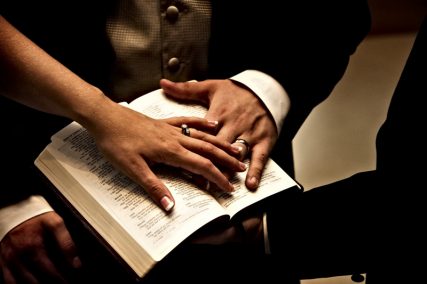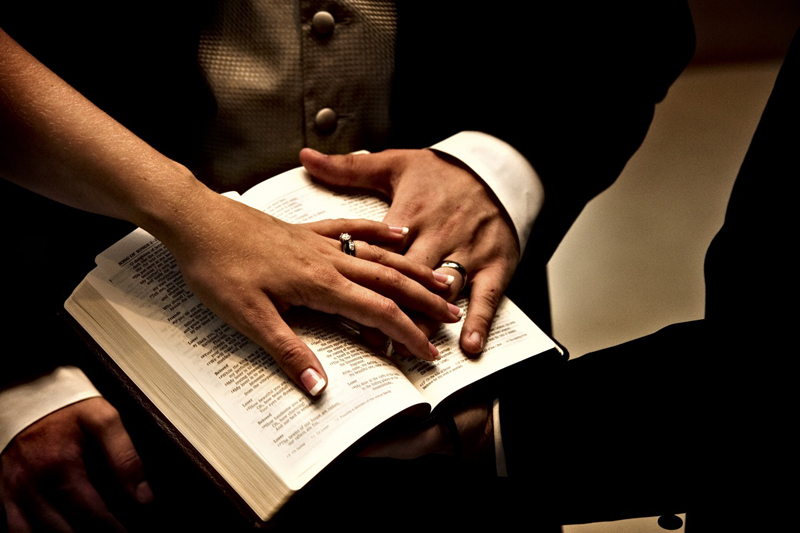
A bride and groom place their hands on a Bible during a wedding ceremony. Photo by Greg Kendall-Ball
(RNS) For decades, evangelical leaders have touted “virginity pledges” as a way for teens and young adults to “save themselves for marriage.”
But what happens after the wedding day?
According to a researcher at the University of Washington, young adult men who took the pledge and had male friends who held them accountable before marriage find themselves suddenly adrift and unable to talk to trusted friends — and sometimes even their new wives — about sex.
“Because these men understand sex as a gift for the marriage bed, it is unthinkable to discuss sexual activity anywhere outside of their married relationships,” wrote Sarah Diefendorf in a paper presented at the American Sociological Association’s convention this week in San Francisco.
“Positive conversations around sex do not occur — and these men assume that conversations regarding sexual practices would only occur in what they think of as promiscuous, risque scenarios (such as a swinger party).”
Diefendorf, a doctoral student in sociology, interviewed 15 young evangelical Christian men in a Southwestern megachurch in 2008, then followed up with them in 2011 — when all but one had married.
The men had a clear demarcation in their views about sex before and after marriage, she wrote: “While sex within marriage is sacred, sex before marriage is a beast that must be controlled.”
But Diefendorf found that what were considered “beastly” temptations — pornography, sex outside of marriage — did not disappear after the wedding ceremony.

Three million students in thousands of churches worldwide have made the True Love Waits pledge, in one of the most popular campaigns for sexual purity. Photo courtesy of LifeWay Christian Resources
“It’s a myth that I think is kind of perpetuated by the lack of communication, is that once you get married, suddenly all those desires are fulfilled in your spouse,” said “Aidan,” the fictitious name she used to protect the confidentiality of one of her interviewees. “It’s not true. Guys are so visually driven. The desire for porn, especially if you struggled with that in the past, is still there. It doesn’t go away once the ring slips on!”
Diefendorf found that the men were uncomfortable speaking with each other about the intimate details of their married lives, in part because they were now talking about their wives as well as themselves.
“These men, who four years prior, had engaged in a very open discourse about sex and sexuality, now find it both highly inappropriate and awkward to engage in these conversations,” she said.
Marty King, spokesman for LifeWay Christian Resources, said an estimated 3 million students in thousands of churches worldwide have made the True Love Waits pledge, in one of the most popular campaigns for sexual purity. In 1994, more than 200,000 pledge cards were displayed on the National Mall.

True Love Waits drew national headlines in 1994 when more than 210,000 cards from teenagers pledging to remain sexually pure were displayed on the National Mall in Washington, D.C. Photo courtesy of LifeWay Christian Resources
Recently, South Carolina evangelist Clayton King has co-authored with his wife, Sharie, a relaunch called “True Love Project,” which focuses on helping students “understand their sexuality in light of the gospel,” including questions such as “What if you’re not a virgin?”
Clayton King said he is not surprised by Diefendorf’s findings.
“I think there’s been a big emphasis on accountability prior to marriage and then an assumption that once you get married you’re just going to figure it out, it’s going to be easy and all sexual temptation will go away,” he said. “And that has not been the case for most of the men that I know.”
The evangelist said the new “True Love Project” book addresses post-marriage sexuality as well as premarital abstinence.
Although it can mean sweaty palms and feeling sick to your stomach, Clayton King said men need to be given permission to talk to their wives first, then trusted mentors and, if necessary, professionals about their questions about marital sex.
“That’s the hurdle that married people have to overcome early in their marriage — having difficult, awkward, tense conversations,” he said. “If you skip over your spouse and just start talking to other people about the marriage, then you are literally cutting out half the marriage and you’ll never be healthy that way. You’ll never reach relational health by only talking to outsiders.”
Diefendorf said the removal of the premarital support group from the men’s lives after they married caused them to “now struggle in isolation with how to best manage their desires.”
As “Aidan” put it: “I would stand up and cheer figuratively if our pastor got up there and said, ‘Hey, I am going to spend the next month talking about sex.’”
KRE/MG END BANKS






